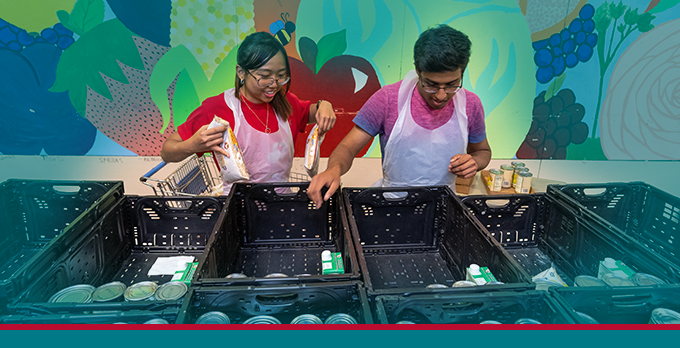Food insecurity is a silent challenge that affects many people in and around The University of New Mexico community. From vulnerable populations to students and graduates, as well as faculty and staff, no one is immune from the struggles of hunger.
Kathryn Coakley, PhD, a public health researcher and assistant professor in the UNM College of Population Health, says food insecurity is associated with a host of other challenges facing UNM students.

“It is important to recognize that food insecurity does not exist in a vacuum. Students experiencing food insecurity are also very likely to experience problems with meeting other basic needs, such as housing, medical services and access to reliable transportation.”
Some individuals are especially at risk for food insecurity, including people of color, sexual and gender minority populations, those living in single-parent households, people living with disabilities or chronic health conditions, seniors and residents of rural communities, Coakley said.
Although recent U.S. Department of Agriculture data show a slight decrease in food insecurity in New Mexico, she says it is important to remember that food insecurity still disproportionately affects certain groups. “Just because our numbers are now on par with national estimates does not mean food insecurity is not still a problem in New Mexico.”
The Lobo Food Pantry (located at the UNM Student Union Building, open Monday- Thursday, 11 a.m. - 5 p.m.) offers vulnerable members of the UNM community a resource to address food challenges. And because UNM is home to more than 27,000 students, the additional support has an impact on communities across New Mexico.
Coakley emphasized the importance of long-term solutions to address food insecurity in higher education. “We are now interested in working with universities and community partners to develop and implement strategies beyond campus food pantries to address food insecurity,” she says.
College of Population Health is also co-sponsoring an upcoming workshop to explore elements of a social movement to tackle food insecurity in New Mexico.
The Food Justice Workshop, set for Jan. 17, 2025, from 1-3 p.m. will include local community food advocates, UNM researchers, social service partners from Presbyterian Healthcare Services, Inc., and the Healthy Here Coalition, with special guest Mariana Chilton, PhD, MPH, of the Drexel Dornsife School of Public Health and founder of Dornsife's Center for Hunger-Free Communities. If interested in attending, you can register here.
In addition to the Lobo Food Pantry, many food assistance resources are available to those in need:
- Roadrunner Food Bank: Offers a Food Finder Map and SNAP assistance.
- The Food Depot: Provides food distribution across Northern New Mexico.
- Rio Grande Food Project: Weekly food box distribution.
- Meals on Wheels New Mexico: Delivers meals to those unable to leave their homes.
- UNM Food & Distribution Sites
